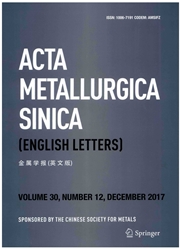

 中文摘要:
中文摘要:
材料的居住效果能在房间温度减少钛合金的疲劳生活。作者组开发的一个统一疲劳生活预言方法在这份报纸被修改预言考虑居住时间和最大的应力的效果的居住疲劳裂缝生长。修改模型能成功地被用来预言裂缝生长率并且在纯疲劳和居住疲劳条件下面计算不同的钛合金的疲劳生活。它被与不同微观结构,居住时间,氢内容,压力比率和压力层次把预言结果与几钛合金的试验性的数据作比较验证。
 英文摘要:
英文摘要:
The dwell effect of the material can reduce the fatigue lives of titanium alloys at room temperature. A unified fatigue life prediction method developed by the authors' group is modified in this paper to predict dwell-fatigue crack growth taking into account the effects of dwell time and maximum stress. The modified model can be successfully used to predict the crack growth rate and calculate the fatigue life of different titanium alloys under pure fatigue and dwell-fatigue conditions. It is validated by comparing prediction results with the experimental data of several titanium alloys with different microstructures, dwell time, hydrogen contents, stress ratios and stress levels.
 同期刊论文项目
同期刊论文项目
 同项目期刊论文
同项目期刊论文
 期刊信息
期刊信息
